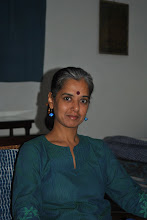Co-creation
That is the new word which I find myself intrigued by. It
tempts me to unravel its layers.
The word has a feel of togetherness and of coming together.
It speaks to me about love, acceptance, shared pride in a
task completed.
And it alludes to the personal kept aside for the
collective- personal egos/targets/credit.
What better example of a space of co-creation than ‘Theatre’!
For, even a theatrical piece that may be a monologue is put
together by a team comprising several individuals.
It is an exhibition of the expertise, skills, ideas and thoughts
of each member of that team. And of how
successfully were they able to keep aside the personal agenda and stay focused
on the collective team effort.
Co-creation is the word that drew me to Aagaaz.
I wanted to experience for myself how a simple workshop for
children was brainstormed over and put together as a meaningful experience for
its participants.
I wanted to experience co-creation in practise.
I write today about one such session when I could join the
dots to make linkages for myself.
The Grand Patch-up
That was the name of the story through which we opened our
module on the theme of ‘Friendship’ with our batch of 7-8 year olds.
The story revolves around the friendship of Mary Sangma and
Josana Marak, neighbours and best friends who like to spend time together, co-creating
toys using wood.
All the same, one day when Josana shows Mary a waistband
that she has spent several days making, Mary is critical of it. Josana is upset
with her response and stops talking to her friend. She refuses to acknowledge Mary’s
presence for many days.
An important observation to make here is that while the 2
friends have co-created several toys together, it was a piece created individually
by Josana that Mary expresses a dislike for.
Could a feeling of having been left out of the process of
creation been at play in Mary’s mind!
How does Mary get their friendship back on track?
The promise of co-creating something new again has Josana
let go of her upset. And the 2 friends bridge their differences, literally.
More power to Co-creation!
How did our 7-8 year old friends take to the story?
While all of them commented on the need for a quick apology
from Mary’s side, one child displayed co-creation in practice. He happily
combined the names chosen by him and his partner to give a new name to the
story, ‘The Gold Computer Patch-up’. The joy in his voice while sharing this was
simple and potent, a joy laced with love and acceptance.
The next thumbnail in this piece on co-creation exposes my view
on theatrically approaching the topic of ‘Friendship’. While I held the view of
first exploring the rituals of a healthy friendship before having the children
dive into a conflicting situation, another view was to arrive at the layers of
a healthy relationship by first gaping at the unpleasant.
What had me keep my personal thought aside and take on the
fellow view was an urge to experience another perspective, submit myself to the
flow and embrace the unfamiliar so to say.
Did I do it graciously? I don’t think so!
I did make a discovery though.
That you learn something new only when you embrace the
unfamiliar.
